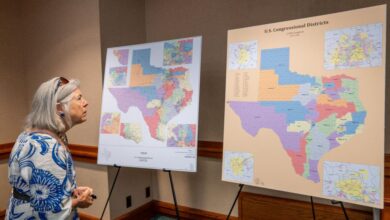Trump clears way for alternate assets like private equity, crypto in 401(k)s

President Trump signed an executive order Thursday allowing alternative assets like private equity, cryptocurrency and real estate in 401(k)s.
The order directs the Labor Department to review guidance around private market investments in retirement plans subject to the Employee Retirement Income Security Act of 1974.
Trump’s directive smoothes the way for private equity and other fund managers to tap into trillions of dollars of Americans’ retirement savings.
It could open up a vast new funding source to managers of alternative assets outside of stocks, bonds, and cash, though critics say it also could bring too much risk into retirement investments.
“The order directs the Securities and Exchange Commission to facilitate access to alternative assets for participant-directed defined-contribution retirement savings plans by revising applicable regulations and guidance,” the White House official said on condition of anonymity.
Such a move could be a boon for big alternative asset managers such as Blackstone, KKR and Apollo Global Management by opening the $12-trillion market for retirement funds, known as defined contribution plans, to their investments.
Some of those firms have already struck partnerships with asset managers who run those plans.
The world’s largest asset manager, BlackRock, plans to launch its own retirement fund that includes private equity and private credit assets next year.
Empower, the second-largest retirement plan provider in the US, said it’s joining asset managers like Apollo to start allowing private assets in some accounts later this year.
Bitcoin, the world’s top cryptocurrency, was aboout more than 2% to $116,819.60 shortly after Trump signed the order at around 3:50 p.m. ET.
Trump ordered Labor Secretary Lori Chavez-DeRemer to work with federal regulatory agencies like the Treasury Department and Securities and Exchange Department – the latter of which was asked to facilitate access to alternative assets.
During Trump’s first term, the Labor Department issued fresh guidance allowing private market exposure in 401(k) plans.
Since his return to the White House, officials have been weighing whether to ease some of the legal concerns that have long kept alternative assets out of retirement plans, which consist mostly of stocks and bonds.
Allowing private assets in 401(k)s gives savers more investment options and could result in greater returns, proponents have argued.
Critics contend these assets are risky and could leave retirement plan administrators vulnerable to lawsuits.
The order follows Trump’s campaign pledge to make the US “the crypto capital” of the world.
He recently signed into law the first piece of legislation regulating stablecoins pegged to the US dollar, and in March issued an executive order calling for the creation of a Strategic Bitcoin Reserve.
Trump’s White House includes venture capitalist David Sacks of San Francisco-based firm Craft Ventures, who serves as the first-ever AI and crypto czar.
His administration has taken a friendlier approach to regulating the industry, dismissing and putting on pause lawsuits and probes that target crypto giants like Coinbase and Robinhood.
The Trump family is involved in several crypto ventures of its own, including a sizable stake in crypto firm World Liberty Financial, investments in a bitcoin-mining company and Trump- and Melania-branded memecoins.
Credit to Nypost AND Peoples




